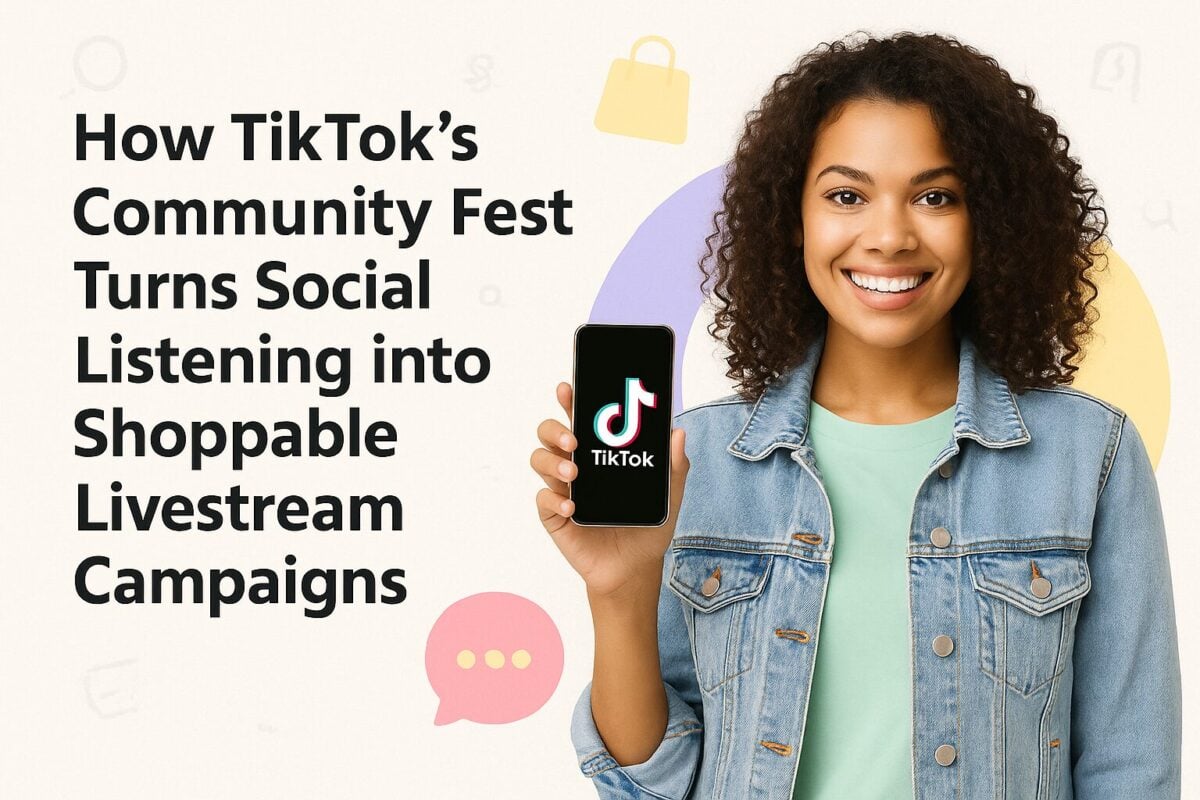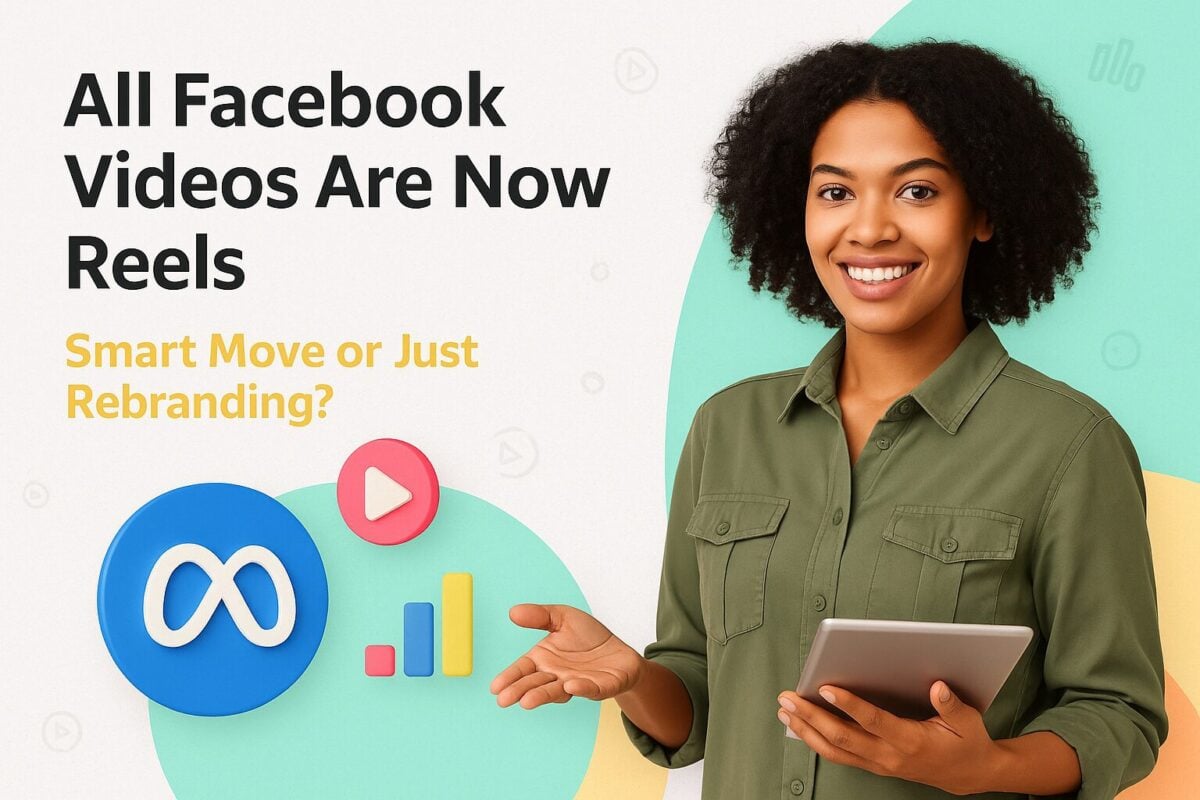The online or virtual world is as real as the physical world for Generation Z. Born around the time when internet access was commonplace, Gen Zers turn to the web to make sense of their lives and connect with their friends and those they admire.
Marketers can't deny Gen Zers' buying power and their influence on one another—as they make up a fifth of the American population—online and offline. Hence, marketers must understand how this generation moves about in their digital environment to reach them effectively.
Gen Z Social Media Usage: Top Motivators and Engagement Tips:
Top Online Hangouts
A majority (88%) of Gen Z spend most of their time on YouTube, followed by Instagram (76%), TikTok (68%), Snapchat (67%), Facebook (49%), and Twitter (47%), based on Morning Consult’s latest survey on the social media use of 1,000 respondents aged 13 to 25.
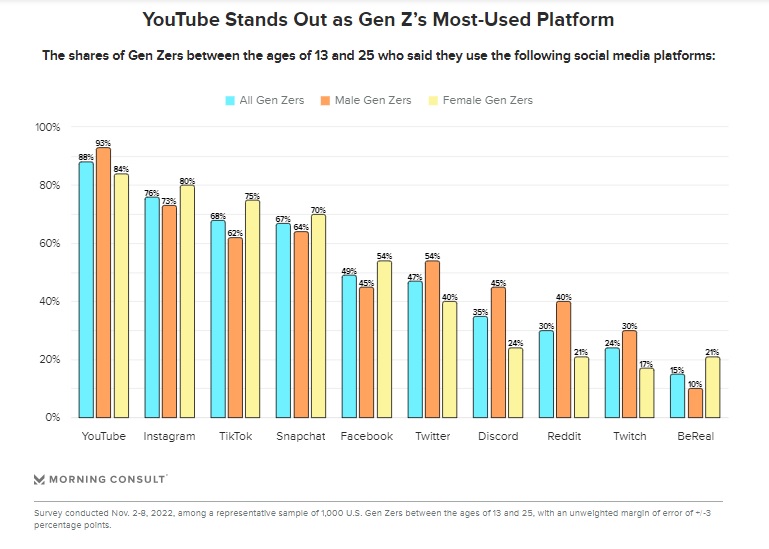
Source: morningconsult.com
An Insider Intelligence poll in the same year also ranked YouTube (25.7%), TikTok (25%), and Instagram (20%) as the most widely used platforms among Gen Z adults (aged 18 to 26).
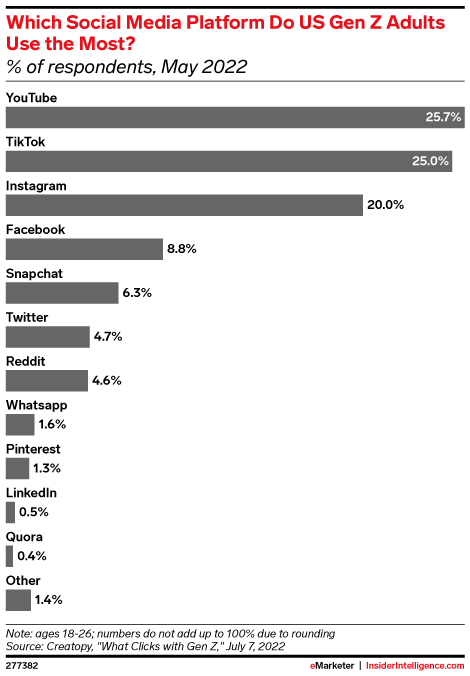
Source: insiderintelligence.com
In the findings by Morning Consult, 93% of those who answered YouTube as their top social platform were male, while 84% were female. Meanwhile, 80% of participants who said that Instagram is their second favorite channel were female, while 73% were male.
Daily Social Media Use: Average Length
Morning Consult also reported that 54% of Gen Zers spent at least four hours on social media (and 38% exceeded that duration). Meanwhile, Insider Intelligence pegged the Gen Z majority's (42.1%) usage at one to three hours.
Interactions Happen Predominantly on Mobile
Most of Gen Zers’ discussions are via mobile text messaging in most cases (94%), followed by phone calls (89%) and social media (88%). As their preferred device, smartphones and apps are where over 60% of this age group go shopping.
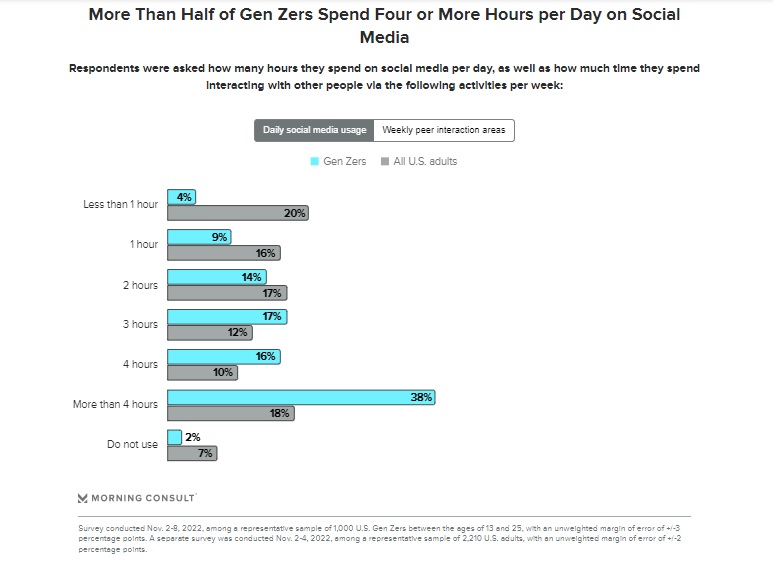
Source: morningconsult.com
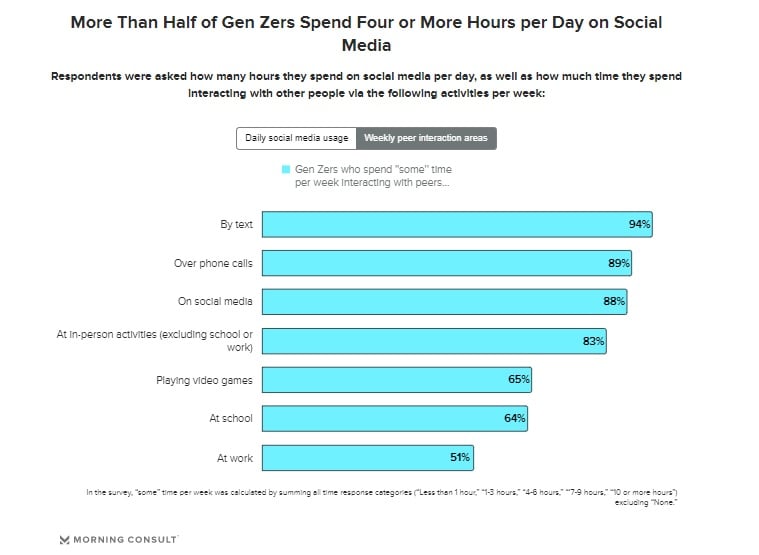
Source: morningconsult.com
How Gen Zers Use Each Type of Social Medi
Gen Zers go to each social platform for different purposes. However, the top two in the list below indicate that Gen Zers aren't always "social online"—they generally enjoy consuming entertaining content they could share with friends besides watching alone.
1. YouTube

Source: resources.360marketreach.com
YouTube helps Gen Z stay abreast of their favorite content creators, learn new things (from DIY projects to new skills), and watch music videos. They love watching high-energy content with little to no product content. At the same time, Gen Zers consider YouTube the third most credible source when verifying product efficacy, as they turn to reviewers from this platform before making a purchase, according to 360 Market Research's Generational Shopper Insights report.
2. TikTok
Gen Zers watch TikTok videos for humor and entertainment. Thus, comedy skits and dance challenges are widespread on this channel. Viewers are more open to seeing product marketing on this platform. Many popular TikTokers have collaborated with brands for product promotions.
3. Instagram
Instagram became a beloved app among Gen Zers mainly because of its photo-sharing feature. The platform's users regularly check their family and friends' accounts to stay updated about them and get beauty and fashion inspirations from their favorite influencers. As more brands created IG accounts, users found it easy to view items and shop directly on the app. Influencers could also send direct messages on IG for collaborations.
4. Twitter
The socially conscious Gen Z use Twitter to discover the latest news and trends, including those that concern their celebrity idols. 21% of Gen Zers are likely to tweet with GIFs, images, and videos. They use Twitter to express their opinions about current events and products and services they see.
5. Snapchat
Snapchat helps Gen Zers connect with their friends using private messaging and public stories, using filters and lenses to have some fun. Through its "What Does Gen Z Want From Brands?" report, the app discovered that 60% of its Gen Z users prefer "brand-purpose messaging," which clarifies a company's "why," its mission beyond profit, and what social causes it supports.
6. Facebook
Besides using Facebook to connect with family members with accounts on the platform, truth-seeking Gen Zers turn to this social channel for information by going to news networks’ official accounts or to Facebook Groups, where they chat and get real-time answers about various topics.
What Messages Appeal to Gen Z
Gen Z: Shopper's Profile
How Do Gen Zers Shop: About half of Gen Zers have carried their pandemic shopping habits, preferring to shop online rather than in-store, according to a GWI survey. Being bombarded by numerous messages and images of enticing products, Gen Z is susceptible to impulsive shopping. Results from the GWI poll also indicate the growth of spontaneous shopping and the appeal of buy-now-pay-later deals among Gen Z shoppers.
What Motivates Gen Z to Buy: Most Gen Zers often stumble upon products while looking for clothing inspiration. And while the conveniences offered by e-commerce can make them vulnerable to buying on impulse, these young folks love bargains. 71% will wait for a product to go on sale before buying, and 45% are willing to purchase a similar item at a cheaper rate. Meanwhile, 34% of Gen Z use loyalty or rewards programs.
Moreover, this shopper segment holds influencers in high esteem—with 75% of them saying their online buys were influencer recommendations.
Themes that Speak to Gen Zers
Gen Z expects businesses to use their websites for straightforward information, such as the company's vision, mission, and performance. So when brands use social media, 360 Market Research's report says that the following themes can draw you to this young segment:
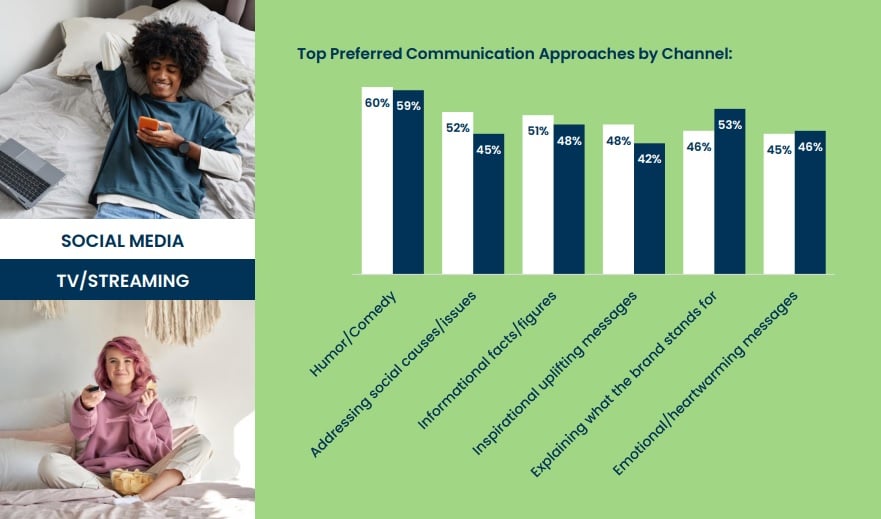
Source: resources.360marketreach.com
1. Humor and comedy (60%)
The fun of doing and watching lip-sync, dancing, and cooking battles is what makes TikTok attractive to Gen Zers in the first place.
2. Social issues (52%)
Snapchat's Gen Z report cited earlier lists three top qualities that Gen Z looks for in brands: fair labor policies, inclusive workplace cultures, and sustainable manufacturing practices. Moreover, this generation quickly notices when brands pay lip service to a cause and operate in ways that violate what they advertise.
3. Informational facts and figures (51%)
Gen Z won't mind when brands incorporate hard facts about products and services on social media content as long as they're compelling and easy to digest.
4. Uplifting and inspirational messages (48%)
The pressures of life—from financial security to social acceptance—can bear a toll on Gen Zers. Brands can get these young consumers’ attention by inspiring resilience, ingenuity, and comradeship.
5. Clarification of brand values (46%)
Authenticity makes brands relatable to Gen Z. Non-celebrity testimonials and user-generated content (UGC) can lend their voices to express what your business stands for.
6. Heartwarming messaging (45%)
Content that offers hope for the future or solutions for issues that Gen Zers encounter daily enables your brand to connect with this age group at the emotional level.
Tips for Connecting with Gen Z on Social Media
Because Gen Z grew up with lifestyle advertising and celebrity co-branding, they can easily sense when messages and events are sales pitches. As a marketer, you must learn how this consumer segment thinks and talks in the platforms where they congregate.
1. Plan campaigns like a content creator.
Seek to entertain and inform first because you can promote products easier once you've built a community. Paid ads might be your option if you want instant or immediate sales on social media instead of long-lasting relationships.
Also, posting content like a creator means less polished—but still clean (not blurry or dark)—visuals that resonate with your specific target communities. Uploading UGC works the best, as Gen Zers prefer real and relatable content—and they love seeing themselves onscreen.
2. Be visually oriented.
Several trends are busting the so-called 8-second attention span of Gen Zers. However, images and videos still reign supreme over text content when marketing to this segment, given their priority for fun and laughter to de-stress. Smartly.io's survey ranks “story/reels/TikTok” as the most preferred ad style (40%), followed by photo carousel showing several photos one can swipe through in one post (27%), and image/in-feed ads (12%).
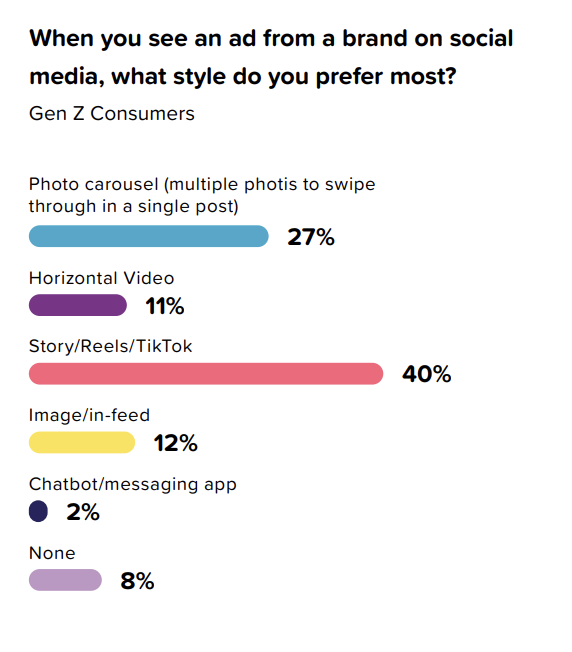
Source: hubspotusercontent-na1.net
Keep written messages concise and mobile-optimized. Include short, relevant, and memorable hashtags.
Testing ads and marketing content can help you determine the most effective creative elements for engagement and sales.
3. Mind your organic content strategy and social customer care.
The comment section is a powerful tool for engaging with your Gen Z followers. Consider social feedback as a listening tool, which can help you learn more about Gen Zers’ needs. You and your team can meet to create sample scenarios and FAQ responses. Although having pre-approved replies will allow team members to respond quickly and avoid bringing each response to the leadership chain, everyone should learn how to personalize messages. Canned or robotic approaches turn off Gen Zers.
Immerse in their language by watching their content and following Gen Z creators—then note the vocabulary, jokes, and acronyms they use. But don't force or overdo it. Better yet, consider hiring a Gen Zer to be part of your social team.
Moreover, set an escalation protocol for handling negative comments from dissatisfied users. However, you must also acknowledge positive comments and posts—instead of simply "liking" them—to increase affinity. Keep it light and fun with emoticons and animated gifs.
4. Respect their data privacy.
Only around 60% of Gen Z believe that financial institutions and retailers can be trusted to protect their data. Thus, they're more likely to perform protective measures, such as deleting user data when they stop using a service and paying for better security.
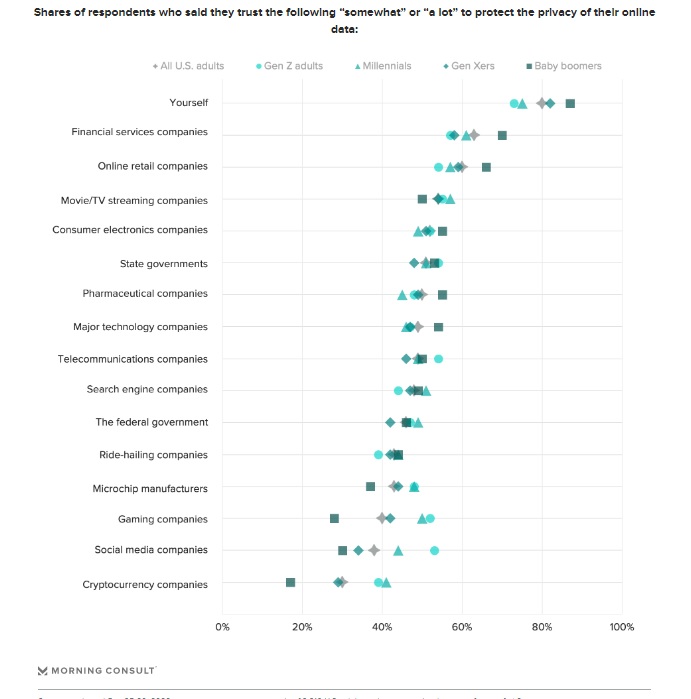
Source: morningconsult.com
5. Share the values and people behind your brand.
Make clear statements about your brand's stance on inclusivity, diversity, and social responsibility. Foster a human connection by sharing interviews with staff and behind-the-scenes videos. At the same time, ensure that your volunteerism isn't "performative activism" because Gen Z can see through the facade.
6. Practice transparency and accountability.
Gen Z values a brand’s trustworthiness next to discounts and products or services offered. As digital natives, these young consumers don’t give a second thought about verifying your reputation via your website, social media accounts, and review sites. They're also unafraid to call out brands for not walking their talk. It's best to be honest—especially when you commit a blunder—and deliver on your commitment to make up for any wrong.
7. Experiment often.
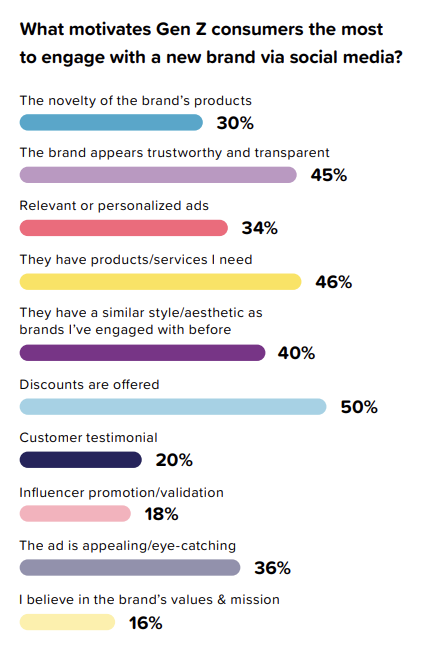
Source: hubspotusercontent-na1.net
Gen Zers are suckers for variety. They're likely to engage with a new business with traits similar (40%) to other brands they've engaged with before, according to the Smartly.io report. At the same time, the novelty of products (30%) and eye-catching ads (36%) of the new brand also get top points. Be flexible with your campaigns to ensure you make enough room for experimentation.
8. Collaborate with Gen Z creators and influencers.
Decide on the characteristics or qualities you want from your creator and influencer partners. Then, use social listening tools to identify the content creators and influencers that your Gen Z audience follows. Research their platforms to check who among them embodies your brand values. After verification, get help from your Gen Z employees and customers in reaching out to these digital stars.
Morning Consult's The Influencer Report shows that influencers have a stronger sway over Gen Z consumers than celebrity and athlete endorsers. The influencers’ credibility is reportedly higher because they display more product or industry knowledge and relatability than showbiz and sports personalities.
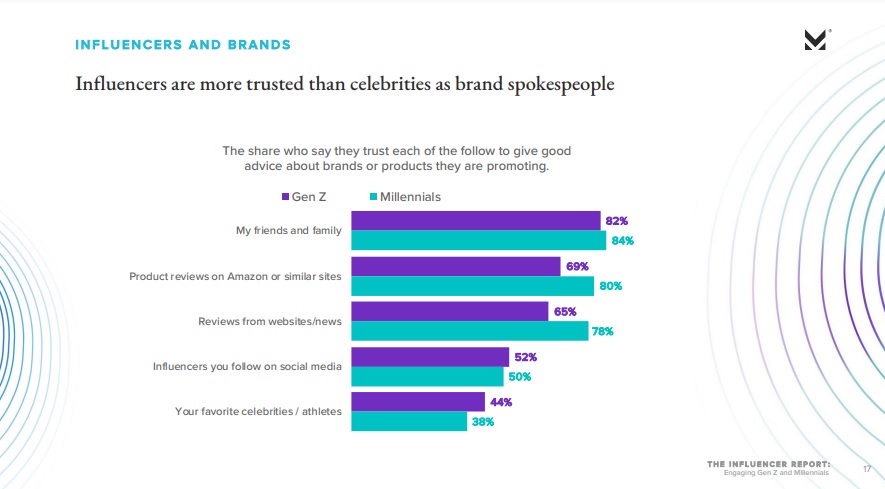
Source: morningconsult.com
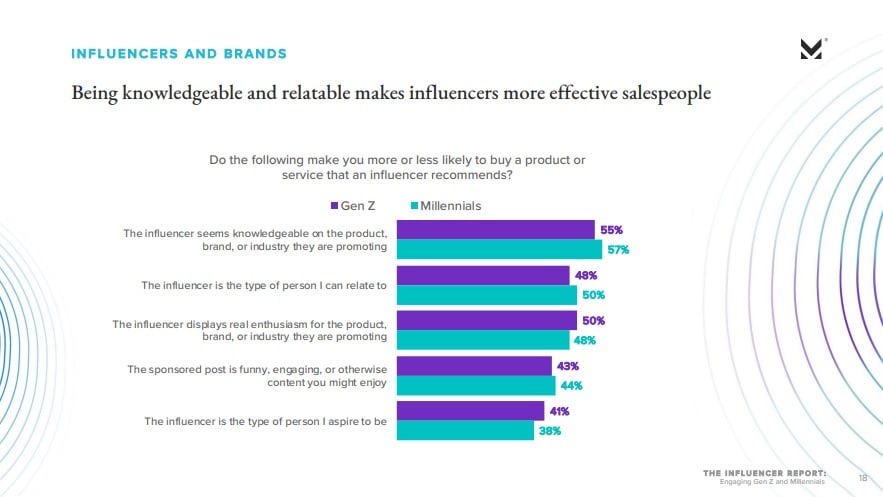
Source: morningconsult.com
9. Offer hybrid experiences.
Although Gen Zers love their phones, they also crave face-to-face interaction. Provide experiences that combine online with in-store or other forms of real-world engagement.
10. Meet their need to get a discount.
The availability of discounts is a top engagement driver between Gen Z consumers and new brands. You can design exclusive offers catering to specific groups, such as students, who are likely to convert to paying full prices after graduation.
Frequently Asked Questions
Are there marketing agencies that cater specifically to Gen Zers?
Yes, several firms specialize in outreach and engagement with the Gen Z market. They include:
- The Influencer Marketing Factory
- Socialfly
- TOP Agency
- JUV Consulting
- Millennial Marketing Agency
- Seed Marketing Agency
- Youth Marketing Connection (YMC)
- NinetyEight
- Carson+Doyle
Their full details are in our guide titled "Top 9 Marketing Agencies for Millennials and Gen Z Consumers."
What are Gen Z influencers like on each type of platform?
Gen Z influencers are abundant on TikTok, Twitch, Spotify, Instagram, and YouTube. How influencer marketing works per platform differs. For instance, on Tiktok, influencer marketing for Gen Zers are more likely to include UGC campaigns and constant monitoring of trends.
How do I start with my Gen Z marketing strategy?
The best way to start formulating your marketing strategy geared toward Gen Zers is by learning the latest trends about this age group. Update your knowledge about this demographic through our feature titled "29 Statistics on Gen Z Spending Habits You Should Know"
